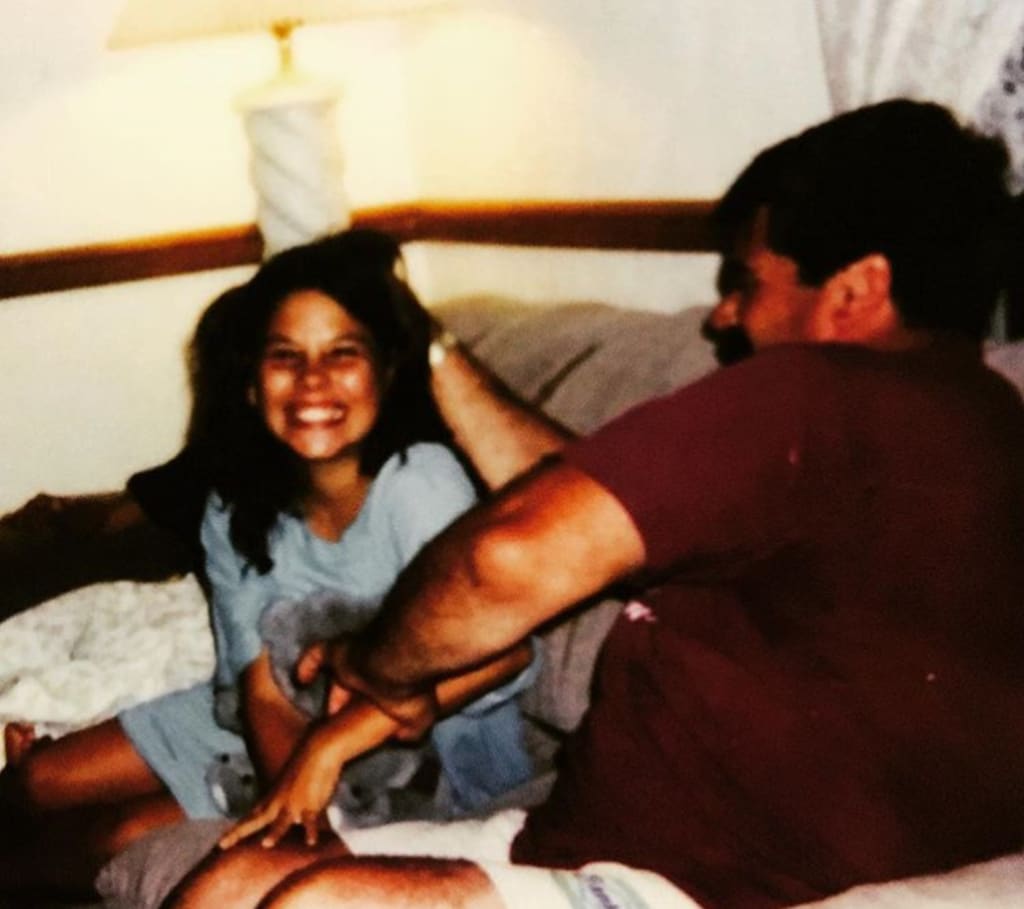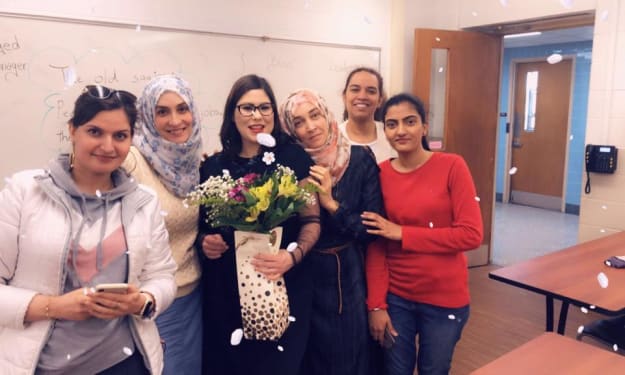Yes, Dad, #MeToo
When fathers are tone deaf to the #metoo movement, what message does that send to their daughters?

Yes, Dad, #MeToo
I have been trying, and failing, to speak my truth for years. To my parents. To my friends. To my coworkers. Every time I open my mouth to speak, I choke. The rare few times I have opened up to family members and close friends, I’ve been rebutted (“Wait, didn’t you sleep with that guy anyway?” “You were drunk.” “Well why didn’t you call the police?”). Eventually, you develop survival techniques for living with your secrets. Some of us happen to favor the unhealthy ones. My personal favorite is: If I distract myself by keeping my glass of [insert alcohol of choice here] full, I won’t think about what happened to me. The problem with my coping mechanism of choice is that, if you’re an unpredictable drunk like me, sometimes all you’ll be able to think about is the one thing you’re trying not to think about. That, or you end up speaking your truth before you’re ready, in fractured pieces to unwilling participants (which, in my case, includes my parents).
Through the years, starting in my twenties before the #metoo movement gained footing and now into my early-mid-30s when the movement seems to have peaked, my own #metoo moments have become a fixation in my life. At first it was subconscious, but then it all became increasingly and more uncomfortably conscious, to the point of damaging my ability to function at work or maintain healthy relationships with others. I began to fixate on daily/weekly/yearly microaggressions, and on my fear of my truth spilling out and falling on deaf ears. Add to this the increasingly bleak political and economic landscape of the past three years and a personal unwillingness to seek professional help, and we have an impressive culmination of overwhelming depression and social anxiety working hard to prevent me from telling my truth. This very not normal way of living essentially became normal to me. Then, one day, I finally tried to have a #metoo conversation with my dad…
I was with my mom and dad vacationing in the Finger Lakes in central New York. Every year, my mom and I spend a week on Seneca Lake. It’s my one chance every year to escape from the noise inside my head and outside my windows. It’s the one week a year I feel free. Also, wine tasting. Lots of wine tasting. This year was different though. This year my father came for the first time, and we accidentally tread into #metoo territory. I could write a book about my relationship with my father, but that will have to wait until I find an excellent therapist (referrals welcome). I'm reluctant to simplify people, but for the sake of time, here’s my dad in a nutshell: A retired butcher, Vietnam veteran, and quick-to-anger, PTSD-suffering, hardworking blue-collar Protestant, but also an often sweet and misunderstood family man, volunteer, and man of many, many, friends. Would you want to have a #metoo conversation with this man? I sure as hell didn’t.
Picture it: An aging mother and father and their 30-something only child sitting around a campfire, each clutching a can/glass/bottle of whatever alcohol keeps them just tipsy enough to tolerate each other. The conversation varies from the weather to plans for the week to gossip about the neighbors mom and dad hate. Awkward silence eats away at most of our time together, but that is preferable for a small talk-loathing introvert like me. And then, out of nowhere, my father brings up Bill Clinton. A news story broke a few days prior about an exchange between a reporter and Clinton, who was promoting his new book with James Patterson. As I recall, the reporter asked Clinton about the #metoo movement and if he still owed Monica Lewinski an apology. Of all the things to talk about on a family vacation in 2018, who the hell picks Bill Clinton and Monica Lewinski? My father, apparently.
He initiated the conversation like a kid with a chip on his shoulder who’s been prepping for his debate club debut. I wondered where his notecards were hidden. If I may paraphrase his rant, he basically said “Why the hell are they harassing my buddy Bill? Did you see? Asking him for an apology. He doesn’t have to apologize to her. She was wrong too. She knew what she was doing.” I watched in horror as he then went on to attack, essentially, the whole #metoo movement. “All these women coming forward now. Why did they wait so long? Forty years some of them. They should have said something. They should have called the police.” Never did he specify the women to whom he was referring. Even I didn’t know. The Bill Cosby victims? Why would a father choose to rant about the #metoo movement to his daughter and wife, both victims themselves of assault and harassment?
I asked him if he knew how common sexual harassment was and how difficult it was to speak up about harassment and assault. I told him that it often takes years for victims to come forward, and only now are more women finally coming forward and sharing their stories because others like them are too, and because there is more support now. That didn’t really sway him. How about a personal anecdote? I thought. “You know, it happened to me too. I’ve been harassed and assaulted many times, and I've never reported any of it. I was harassed by two different men who worked with me when I was a teacher.”
“Why didn’t you call the police?” he said. “Hell, call the police now! Tell them what happened. Turn his ass in.”
“Dad, one of the guys used to date a police officer. He’s friends with the whole police department. It would be my word against his, against theirs, and no one would believe me.”
“So what!?”
So what, indeed. I decided to stop, not only because I was triggered, but because I knew I would never get the response from my father I’d hoped for. No “I’m sorry that happened to you.” No “What can I do?” No “I love you and I’ll support you no matter what.” I hope those are the responses most girls get from their #metoo moments with their fathers, but that’s not what I was ever going to get from mine.
I decided not to tell him about the first time I was date raped, on a first date by a guy I met online. Or the time I was roofied and lost an entire night’s worth of memories. Or the other time I was date raped by a man I knew would physically harm me if I said no; who afterwards harassed me for days with phone calls and text messages from different numbers. Who knew where I lived. Who caused me to have an emotional breakdown in public months later, and flashbacks even today. I didn’t give my dad details about the teacher who sexually harassed me at work. The teacher who, like me, taught English to refugee and immigrant teenagers, but whose students came to see me after school because they didn’t understand him. The teacher with whom I was forced to share a classroom. Who commented on how “voluptuous” my ass was one day while I bent down to put my lunch in the mini fridge. Who was praised by the principal in front of all the other teachers for work that I alone did. Who then took my job. I didn’t even bother to tell my dad about the time in middle school when I was sexually assaulted for the first time, when a classmate grabbed my breast in the middle of the hallway as I was walking to class. The assault which leaves me even to this day, even now as a teacher, walking with my arms folded tightly across my chest whenever teenage boys are in the hall.
What do you think he’d say if I told him? Should I call the police on all of them, Dad? Or do you think I was wrong too, like Monica? I wonder what happens to other girls and women with fathers like mine. Living in the time of the #metoo movement should be liberating. And it is, mostly. But how can we all come forward and speak our truths to the world if we can’t even speak them to our dads?
If anything, my bizarre #metoo experience with my father has taught me that for some people, parents are the ultimate confidantes, but for many, they simply aren’t. It’s increasingly important for women and girls to be able to identify those in their lives whom they can trust and confide in and those they cannot. Not all parents are ‘unconditional love and acceptance’ parents. Not all parents accept (or understand) the #metoo movement, but hopefully we all have someone in our life who does.
About the Creator
Brooke Elizabeth
Working-class English Educator with Expertise in Refugee and English Language Learner (ELL) Education. I have a Master of Arts in International Development, a Master's in Education, and A LOT of existential dread.






Comments
There are no comments for this story
Be the first to respond and start the conversation.